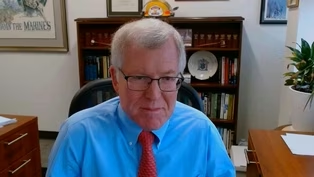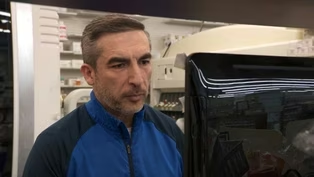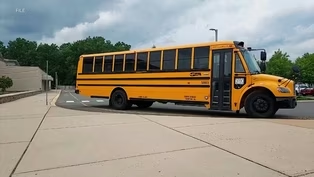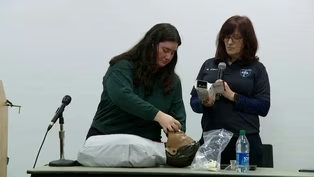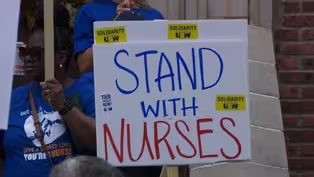NJ Spotlight News
NJ Spotlight News: November 29, 2023
11/29/2023 | 26m 46sVideo has Closed Captions
Watch as the NJ Spotlight News team breaks down today's top stories.
We bring you what's relevant and important in New Jersey news, along with our insight. Watch as the NJ Spotlight News team breaks down today's top stories.
Problems playing video? | Closed Captioning Feedback
Problems playing video? | Closed Captioning Feedback
NJ Spotlight News is a local public television program presented by THIRTEEN PBS
NJ Spotlight News
NJ Spotlight News: November 29, 2023
11/29/2023 | 26m 46sVideo has Closed Captions
We bring you what's relevant and important in New Jersey news, along with our insight. Watch as the NJ Spotlight News team breaks down today's top stories.
Problems playing video? | Closed Captioning Feedback
How to Watch NJ Spotlight News
NJ Spotlight News is available to stream on pbs.org and the free PBS App, available on iPhone, Apple TV, Android TV, Android smartphones, Amazon Fire TV, Amazon Fire Tablet, Roku, Samsung Smart TV, and Vizio.
Providing Support for PBS.org
Learn Moreabout PBS online sponsorship>> Funding for "NJ Spotlight News" provided by members of the New Jersey Education Association, making public schools great for every child.
And RWJBarnabas Health, let's be healthy together.
>> tonight on NJ Spotlight News, New Jersey Palestinian families watch and wait as the six-day truce between Israel and Hamas comes to a close.
Once the fighting continues, what does it mean for their loved ones still stranded in Gaza?
>> Hopeless.
This is the most cruel war I have ever seen in my life.
>> Devastated.
>> Plus, home grow.
The governor signaling he is open to allowing you grow recreational cannabis at home.
>> It will not disrupt the industry in any significant way.
It is not something corporate cannabis should be worried about.
>> It's day 118 of the RWJ nurses strike with no end in sight as the hospital reveals it has paid over $120 million for their replacements.
Building an electric school bus fleet.
Environmentalists looking to replace the more than 10,000 diesel buses, but at whose cost?
>> We are running tight with our budget so that added money is not feasible for us.
>> NJ Spotlight News begins right now.
♪ >> from NJPBS Studios, this is NJ Spotlight News with Briana Vannozzi.
Briana: thank you for joining us.
Negotiators are working feverishly toward another potential extension of the truce between Israel and Hamas, now in its sixth and final day, with a key mediator in Qatar telling national news outlets they are optimistic another extension will be announced.
Hamas released 81 hostages, primarily women and children, during the first five days of the pause in fighting, while Israel freed 180 Palestinian prisoners.
The Israeli military said it believes there are still an estimated 159 hostages held in Gaza, taken during the October 7 Tara attack by Hamas in which 1200 Israelis were brutally murdered.
News of another extension comes as Hamas releases another set of hostages today with at least one American citizen expected among them.
While the flow of aid has increased to Gaza, the U.N. secretary says it's not nearly enough for the 2 million Palestinians living in a humanitarian crisis.
More than 14,000 Palestinians have been killed by the Israeli military in the war, mostly women and children, according to the Gaza health ministry.
Senior correspondent Brenda Flanagan caught up with one Palestinian New Jersey man who spoke with her at the beginning of this conflict and whose list of family members killed is only growing longer.
>> I would love to see a permanent cease-fire.
I can't imagine going through this cycle again.
Brenda: But Amjad said it is hard to keep his mind on work even with a cease-fire.
He has lost at least nine family members in the conflict and the remaining ones struggle to survive.
He says dozens of relatives who fled bombing in the north now struggle for safety in cramped apartments, cooking over cinderblock stoves.
>> The women and children sleep inside the apartment, the men sleep in the circus.
Imagine 50, 60 people in a one bedroom apartment for the last 50 days.
How do they use the bathroom?
Brenda: Behind them, bombed buildings dominate a ravaged landscape, food remains scarce, and people scramble for drinking water.
Thousands live in tents.
Amjad's family is using the cease-fire to reunite living relatives.
They charge cell phones when they can and Amjad tries to text every day.
He tears up when asked how he feels.
>> Hopeless.
I mean, this is the most cruel war I have seen in my life.
How do I feel?
Devastated.
Brenda: The 54-year-old pharmacist came to the West in 1988, raised a thriving family of five, and named his pharmacy Sheefa after the Gaza Hospital where he was born.
Israeli forces stormed the hospital while the namesake business prospers.
He feels helpless but watches news obsessively.
>> I have had many challenges, many issues in my life, personal, business, and so on.
This has been the most devastating time I have experienced.
As much as I tried to take myself out of this moment, I can't.
Even my kids ask me that.
They have to stop watching.
I feel guilty.
Brenda: Even if the cease-fire continues and all hostages are returned, what happens to the families, to all of Gaza?
>> Right now we are trying to save people's life.
If you ask me what would I like to see out of this, stop the killing, the murdering.
Brenda: Amjad says he hopes for peace but is not confident, with political hostility inflamed he is hesitant to wire cash to family in Gaza.
>> My cousin called to send some money.
I said the FBI is going to be knocking on my door.
Brenda: Even if there is a diplomatic solution, the logistics remain.
>> The scale of destruction in Gaza is unimaginable.
None of my family members' homes is left in North Gaza.
They have no home to go back to.
They have no business to go back to.
They have no school to go back to.
They simply have nothing to go back to.
Brenda: Rebuilding houses is easier than healing so many families' broken hearts.
Brenda Flanagan, NJ Spotlight News.
Briana: Recreational cannabis has been legal in the state for two years but it is still a crime to grow it yourself.
Despite attempts by lawmakers to push through a home Groveville.
On Monday Governor Murphy signaled he is open to the bill -- the idea, something he has only implied in the past.
What will it take politically to get there?
David Cruz reports.
David: In the time it has taken for the New Jersey cannabis market to get running, you could have grown your household's own supplies, but that would be illegal and subject you to five years in prison.
After almost three years, is this the cannabis future we all imagined?
>> If you are a small business and you get a license to open a retail dispensary, you can only buy wholesale product from four or five giant corporations.
Some of these companies have operated in New Jersey for more than a decade, operating medical marijuana companies.
They have charged $60 and $70 an eighth for more than 10 years.
David: That's $500 an ounce and regular users will tell you the quality is not top shelf.
If this is your medicine, $500 an ounce starts data up.
In most states where weed is legal to buy, there is an allowance for a certain amount of homegrown.
In New Jersey, that's a felony.
Activist Jay Lassiter and others have pushed for legalized homegrown for years.
>> We are fighting for home grow, available in every other state.
I believe that is low hanging fruit.
The fact that Trenton politicians have not gone around to doing anything about it proves how dysfunctional Trenton is and their inability to actually accomplish really easy stuff that would help a lot of people.
David: When Governor Murphy recently told news 12 that he was open-minded about supporting homegrown, it raised hopes.
>> If I were a betting man, I would bet that's where this Woodland.
I understand, having said that, why it wasn't in our initial regs.
I think there is a rightful objective to get this industry on its feet and make sure the folks who are in this as a matter of commerce are successful.
With a huge amount of focus on equity.
David: The governor, open-minded were not, doesn't really pose the bills necessary to allow for that.
The Senate President does.
He says allowing home cultivation would impact the state's still nascent cannabis industry.
A senator has been working on getting the Senate President to post a bill.
>> My bill has bipartisan support.
I talked to be Senate President a week or two ago.
He is still not there.
I am going to continue to lobby him that this is not going to impact the industry.
I appreciate the governor coming out.
Home grow can impact a lot of folks, especially medical patients.
David: Senator Singleton has a bill that would legalize home grow for medical patients.
He says the high prices are on acceptable.
>> We have tried to give the cannabis regulatory commission an opportunity to try and put some pricing controls in place.
I think now, honestly, it is time for the legislature, because I don't think the CRC has done enough to interject some price controls in this space.
David: Try getting that past the Senate President, who remains the industry's biggest champion despite skeptics wondering how the equity and access promised by legal weed has yet to be delivered.
David Cruz, NJ Spotlight News.
Briana: The state is still trying to get the word out about ramped up access to Naloxone, the powerful opioid overdose antidote that has saved lives as the epidemic continues.
Last year the Murphy administration started a first of its kind program allowing anyone in New Jersey to get free Naloxone from a pharmacy without the fear of law enforcement getting involved.
Experts say the public is still mostly unaware of its effectiveness and how to administer the drug to someone in need.
Senior correspondent Joanna Gagis reports on another effort to change that.
>> We know this person needs Narcan.
You come back with this but you don't know how to use it.
Joanna: Students and faculty attended a Montclair State University training where they learned how to administer the opioid overdose reversal drug Narcan.
>> press the red plunger firmly, that's it.
Joanna: They were taught to look for telltale signs of an overdose caused by opioids.
>> We see tiny pinpoint pupils that remain fixed at that pinpoint size regardless of the amount of light present or taken away.
Joanna: Also blue lips and no signs the person is breathing.
>> If you were to take a whole bunch of opiates or opioids, your breathing would slow potentially to a rate that is no longer going to sustain life.
That is what is going to kill someone who is overdosing on an opiate.
>> In 2022, over 100,000 people have died from overdose.
A staggering amount.
Just in New Jersey, about 3000 people have died from overdose.
We have been in the midst of this crisis for a couple of years now and despite funding and some interventions implemented, we have not been able to make the kinds of progress everybody wants to.
Joanna: Which is why there is renewed focused on harm reduction efforts, according to Professor Svetlana Shpiegel.
>> Clients engage in services and after a little bit they drop out because they are not able to sustain sobriety.
Access is required for continued service engagement.
They are going to drop out.
Harm reduction allows them to say, we are welcoming you as you are.
We want you to be honest about your use and we will help you to the extent we can.
Joanna: To help further, the University is offering a new graduate level harm reduction certificate.
>> It is called harm reduction approaches to substance use.
The goal of the certificate is to address training of human service professionals.
>> New Jersey is going through a transition point.
The entire field is going through a transition where we are seeing a lot of people talk about Naloxone as a way to enable people to use more drugs more often and that is not true.
We are seeing people are beginning to embrace an evidence-based measure to prevent loss of life.
Joanna: Some attendees voicing concern about the legal implications of calling for help.
>> Calling the police for an overdose, would there be repercussions for someone else using, the person with them to get in trouble?
I remember that a person passed away a few years ago because a person he was using with was scared to call the police.
>> Our number one priority would be to save that person's life.
>> On campus we have a medical amnesty policy which states you are not going to be put through the University conduct system if you call for medical assistance for yourself or someone else who needs it after taking drugs or alcohol.
Joanna: A shift in tone from the war on drugs to a helping hand waiting for someone to take it.
Joanna Gagis, NJ Spotlight News.
Briana: Former State Senator Bob Gordon is stepping down from his position on New Jersey transit's Board of Directors when his term expires next week.
The longtime public servant was one of the authors of a sweeping reform law Governor Murphy signed in 2018, overhauling the transportation agency, and was an advocate for commuters.
Gordon's background as former chair of the Senate transportation committee made him an outspoken member of the board, who often asked pointed questions and pressed for transparency.
He is the third person to leave the New Jersey transit board this year, all who were appointed as part of that reform law.
I asked Bob Gordon why he is leaving and what it means for commuters.
It's great to see you.
Thanks for coming on the show.
You served four years on the board for New Jersey transit.
You told the governor it is time to step down.
My?
>> I wanted to complete my term.
I have taken on some new responsibilities.
I have joined an organization that is a government relations firm.
It is an opportunity that will allow me to continue keeping my hand in public policy and working on the issues I care about.
I really feel I need to give that the time it requires.
Briana: Do you feel like New Jersey transit has achieved what it laid out when you wrote the legislation to bring about more transparency and start the process of reforming an agency that had not been through that in decades?
>> You are right.
The bill that Senator Weinberg and I offered, enacted in 2018, was the first provision since the creation of New Jersey transit in 1979.
We were naive and that we did not appreciate that every organization, including New Jersey transit, is resistant to change.
I do think we made a great deal of progress.
We expanded the board to include a group of people with a great breath of experience, very relevant experience.
We created a board in which there is more transparency and accountability.
While the board has not yet established the kind of partnership with senior management that I wanted to see, the board has, on a number of occasions, shaped policy.
Briana: Are you worried about your voice being missing from the discussion?
>> I am not essential to the operations of New Jersey transit.
There will be others I hope appointed who will fulfill that function.
There are some great people on the board now who I am sure will continue their good work, asking questions and probing and demanding answers from the staff.
Briana: Top challenge that you can name?
>> In fiscal 20 26, financial projections show a deficit, a fiscal cliff, of over $900 million, and the organization needs to fill that hole.
And ideally find a long-term, stable source of funding for the organization.
Briana: There is now only going to be one member left who is a commuter, someone who uses the transportation system.
The other members, yourself included, have all either not been reappointed or have chosen to leave.
>> we certainly hear from our customers -- there are a number of people commenting in our meetings and letting us know what didn't happen on a particular train that should have.
I do think it's important for the board to have people who have real world experience riding the rails or the buses.
Briana: Former State Senator and New Jersey transit board chair member Bob Gordon, thank you so much.
>> My pleasure, good to see you.
Briana: In our spotlight on business report, the Robert Wood Johnson University Hospital nurses strike is heading into its fifth month, costing both sides of the picket line money.
More than 1700 nurses who walked off the job at the beginning of August have been without pay or health benefits.
The hospital says it spent more than $120 million so far on replacement nurses with the highest levels of certification to keep the facility operating.
Striking nurses are waiting for the hospital to respond to their latest contract proposal, submitted last week.
A spokesperson for the nurses union says the proposal is similar to what the group has been asking for since the strike began.
Staffing levels related to nurse-patient ratios and getting rid of penalties related to nurses who call out sick.
The unit says there is no deadline for the hospital to respond and there are no mediations or negotiations scheduled now.
Stocks are still on pace for a big November rally.
Here is how the markets closed today.
>> support for the business report provided by Rowan University, educating New Jersey leaders, partnering with New Jersey businesses, transforming New Jersey's future.
Briana: The U.S. Coast Guard this week is responding to reports of tarballs washing ashore in Monmouth County.
The tiny dark balls of oil were first spotted on Monday, according to the environmental group clean ocean action.
It was in a six mile area of Longbranch and Monmouth Beach near seven Presidents Park.
The Coast Guard says shoreline inspections from Sea Bright to Longbranch are underway and so far no oil sheen has been spotted.
It is unclear what the source may be.
They are typically remnants of oil spills but can also originate from natural steeps, places where oil and gas have naturally entered the ocean and slowly leaked out of the ground.
State and county authorities are assisting the investigation and asking anyone who sees tarballs or oil to contact the Coast Guard's national response Center.
The push to go electric isn't just targeted for personal vehicles.
State environmental leaders also want school districts to tap into federal and state funding to electrify their bus fleets.
They argue diesel school buses pump pollution into the air and expose students to harmful fumes.
There is already a couple hundred electric buses on the roads in New Jersey.
As Ted Goldberg reports, there is a lot of work and money needed to phase out the 10,000 existing school buses in the state.
Ted: Electric school buses could soon be coming to a district near you.
Advocates say it is a win for the environment and the lungs of anybody who rides them.
>> We don't want the next generation of schoolchildren to be breathing dirty diesel fumes.
It is bad for their lungs and impacts school performance.
>> Neighborhoods are breathing this.
>> I was in elementary school in the 1960's, so I remember the old school buses that spewed out diesel fuel and exhaust.
Ted: The Trenton Mayor was one of the speakers at a luncheon aimed at people interested in turning their diesel school buses into electric.
>> This cuts down on it by using electric vehicles.
We are excited about the opportunity to apply for replacement of up to 200 or more school buses in Trenton.
>> It is the coming thing and everybody is looking to see what we can do to eliminate diesel fumes.
Ted: Heather oversees more than 30 school buses for the Hopewell Valley regional District.
She is learning more about state and regional grants to pay for the buses, which can run more than $400,000 a pop.
>> School buses are about 1.5 to two times as expensive as regular buses, plus the expense of the charging stations.
>> We are running tight with our budget, so that added money is not feasible.
Ted: It could become more feasible thanks to the bipartisan infrastructure law, which allocates money for electric and clean fuel school buses.
>> The way it's looking, it will be about $1 billion a year.
>> We need grants that are flexible within the contracting laws that New Jersey has.
Ted: Despite the price tag, EPA employee Lilly black says electric school buses are starting to spread.
>> We are seeing them everywhere from dense metropolitan areas like New York, Trenton, but also more rural, Montana, Wyoming.
Ted: Rachel Lane works for school transportation of America, the second largest private bus contractor in the country.
She says making electric buses widespread poses challenges beyond just dollars and cents.
>> It is different from site to site because it depends on how many buses, what their route characteristics are, what the utility rate book is, how you are trying to minimize power consumption and costs.
>> We are hoping to turn over the entire fleet by 2035.
The question is, are there going to be funds?
It is optimistic, but the same goal New Jersey transit has for their electric buses.
Ted: Governor Phil Murphy recently conditionally vetoed a bill that would give $15 million to school districts for these buses.
Environment NJ director Doug O'Malley says he is confident lawmakers will fix the bill and help make it a law during the lame-duck session.
>> The governor did a conditional veto to ensure the funding being used was FY $2024.
It is a small change, very important.
We hope he removes the conditional veto next month so this program can get rolling by early 2024.
Ted: New Jersey isn't alone growing electric school buses.
Today New York State allowed an environmental bond for buses running on electricity and clean fuel.
Ted Goldberg, NJ Spotlight News.
Briana: That's going to do it for us tonight, but dune in night for Chat Box with David Cruz, especially if you are a commuter.
David looks at top frustrations for residents using the road, rails, and buses and talks to experts about whether commuters should expect fare hikes and pole increases in the new year.
That's tomorrow night at 6:00 p.m. on the NJ Spotlight News YouTube channel.
I am Briana Vannozzi.
Thanks for being with us.
We will see you right back here tomorrow night.
>> NJM Insurance Group, serving the insurance needs of residents and businesses for more than 100 years.
And by the PSEG foundation.
♪
Former Sen. Bob Gordon stepping down from NJ Transit board
Video has Closed Captions
Clip: 11/29/2023 | 4m 40s | Gordon considered to be an advocate for commuters (4m 40s)
His life's in Paterson, but family struggles in Gaza
Video has Closed Captions
Clip: 11/29/2023 | 4m 51s | Amjad Abukwaik's family is using the ceasefire to reunite living relatives (4m 51s)
New legislation to allow home-grown cannabis
Video has Closed Captions
Clip: 11/29/2023 | 4m 1s | Sen. Singleton says the current high prices are unacceptable (4m 1s)
NJ school districts want more funding for electric buses
Video has Closed Captions
Clip: 11/29/2023 | 4m 12s | State lawmakers are looking to set aside $15 million for purchases statewide (4m 12s)
Overdose reversal training for college students, faculty
Video has Closed Captions
Clip: 11/29/2023 | 4m 15s | Montclair State University hosted a training on using Naloxone (4m 15s)
RWJ nurses’ strike enters 118th day
Video has Closed Captions
Clip: 11/29/2023 | 1m 18s | Nearly 1,700 nurses walked off the job in August (1m 18s)
Providing Support for PBS.org
Learn Moreabout PBS online sponsorship
- News and Public Affairs

Top journalists deliver compelling original analysis of the hour's headlines.

- News and Public Affairs

FRONTLINE is investigative journalism that questions, explains and changes our world.












Support for PBS provided by:
NJ Spotlight News is a local public television program presented by THIRTEEN PBS
